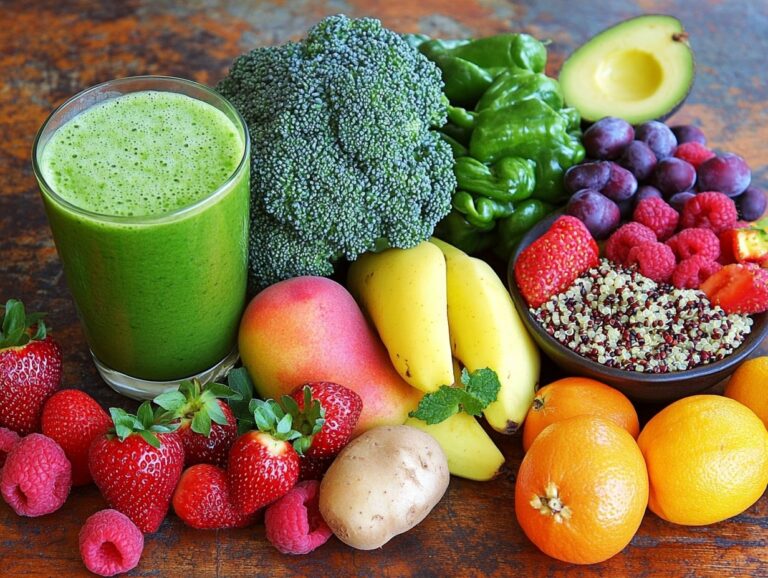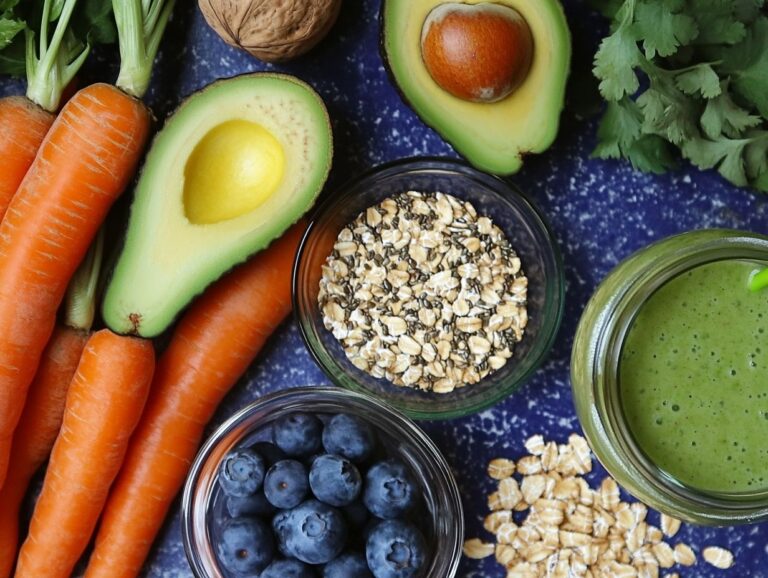Polycystic Ovary Syndrome (PCOS) is a prevalent endocrine disorder in women that often results in hormonal imbalances and various health complications. Understanding the role of diet is crucial for effectively managing this condition. Certain foods can significantly influence PCOS symptoms, and a vegan diet may offer specific benefits. This article will explore the impact of particular foods on PCOS symptoms, the potential advantages of a vegan diet for women with PCOS, and provide practical guidance on creating a balanced, plant-based meal plan. Discover how nourishing your body can enhance your hormonal health.
What is PCOS?
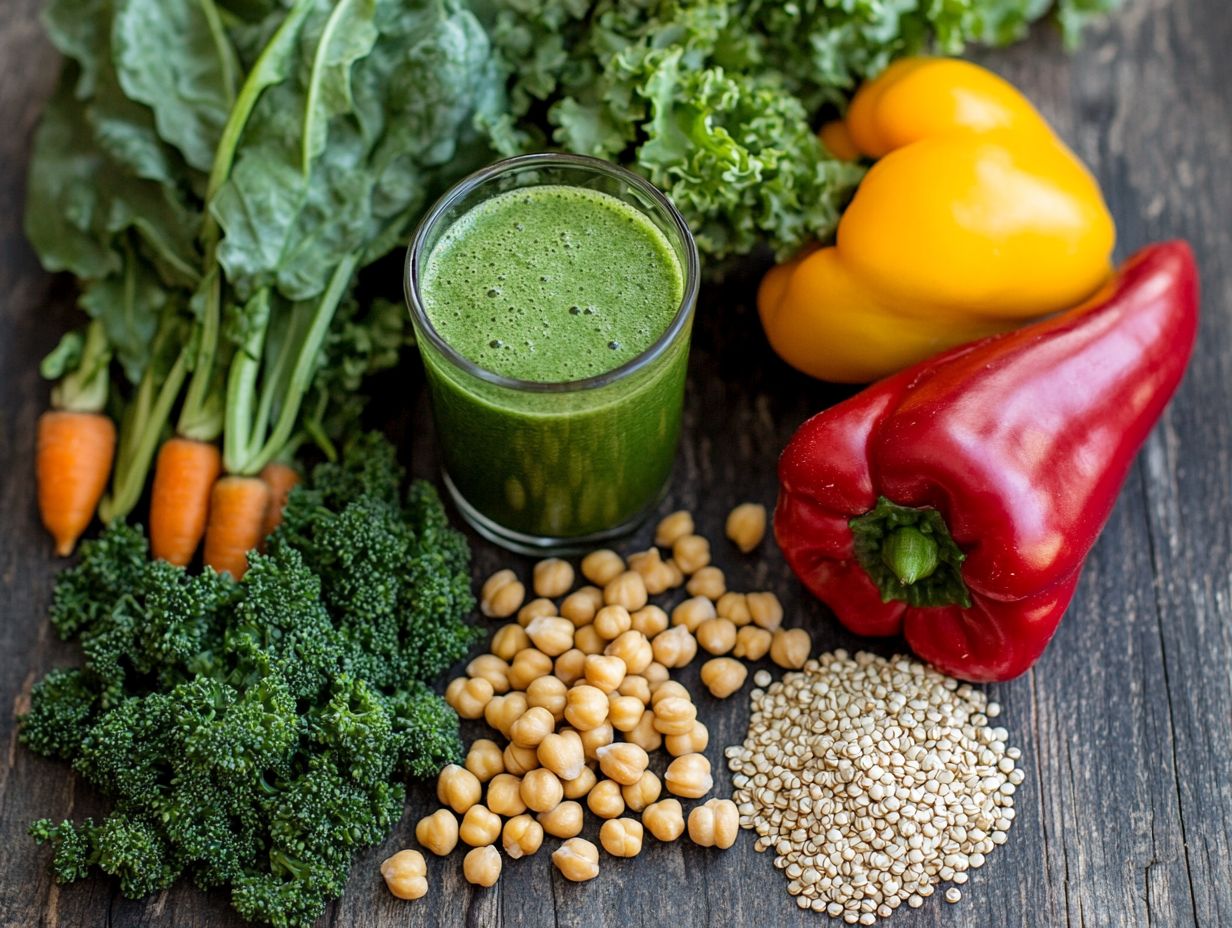
Polycystic Ovary Syndrome (PCOS) is a complex hormonal disorder that affects women of reproductive age. It is characterized by various symptoms, including irregular menstrual cycles, weight gain, and insulin resistance.
This condition is often associated with an imbalance of hormones such as androgens, estrogen, insulin, and testosterone, which can lead to significant health complications if not managed properly. Recognizing the signs of PCOS and understanding its underlying causes are essential for effective treatment and self-care, including lifestyle modifications and stress management.
How Does Diet Affect PCOS?
Diet and lifestyle play crucial roles in the management of Polycystic Ovary Syndrome (PCOS), particularly for those affected by insulin resistance, which is common among women with this condition. Incorporating principles of functional medicine can offer additional insights.
A healthy PCOS diet can help regulate blood sugar levels, alleviate symptoms, and enhance overall health and well-being by focusing on nutrition and glycemic index management.
Incorporating meals rich in lean proteins, vegetables, and low-glycemic foods can significantly improve hormonal balance and aid in preventing weight gain. Exploring intermittent fasting or a ketogenic diet may also offer benefits for some individuals.
What Foods Should Be Avoided?
Individuals with Polycystic Ovary Syndrome (PCOS) should avoid certain foods that can exacerbate symptoms and disrupt hormonal balance. Highly processed foods, especially those with added sugars, are detrimental for those with PCOS because they increase insulin resistance, leading to weight gain and negatively impacting overall health and wellness.
To promote better health outcomes, refined carbohydrates, high-sugar snacks, and unhealthy fats should be eliminated from the diets of individuals with PCOS. Specific examples of foods to avoid include:
- White bread
- Pastries
- sugary cereals
- Sweetened beverages
These can cause spikes in blood sugar levels. Such increases in blood sugar are typically followed by higher insulin production, resulting in weight gain and further hormonal imbalances. Additionally, trans fats found in fried foods and certain margarines should be avoided, as they are linked to inflammation and a worsening of PCOS symptoms. Monitoring health outcomes and engaging in regular health monitoring can be beneficial.
Instead, whole grains, lean proteins, and healthy fats are recommended, as they can help create a more balanced metabolic state, which is essential for effectively managing this condition.
What Foods Should Be Included?
Eating a diverse range of nutritious meals is a crucial aspect of managing Polycystic Ovary Syndrome (PCOS). A well-rounded PCOS diet should include vegetables, lean proteins, and healthy fats, while also incorporating dairy substitutes if dairy poses a problem due to cultural preferences or lactose intolerance.
These foods aid in regulating insulin levels and promoting hormonal balance, which contributes to improved overall health and symptom relief.
Colorful vegetables, such as leafy greens, bell peppers, and broccoli, provide essential nutrients and antioxidants. Lean proteins found in chicken, turkey, beans, and legumes support muscle repair, maintenance, and energy provision. Healthy fats from sources like avocados, nuts, and olive oil are beneficial for heart health and can help reduce inflammation.
A balanced diet not only assists with weight management but also plays a significant role in alleviating the often troublesome symptoms associated with PCOS, highlighting the importance of healthy eating habits.
Can a Vegan Diet Help with PCOS?
A vegan diet may benefit individuals with Polycystic Ovary Syndrome (PCOS), particularly women suffering from insulin resistance. A well-structured vegan diet for PCOS should be rich in whole foods, including fruits, vegetables, legumes, and whole grains, which are essential for enhancing overall health and nutrition.
Furthermore, a vegan diet offers better alternatives for dairy replacements while emphasizing nutrient-dense foods that promote hormonal balance.
A key component of a vegan diet for managing PCOS is the focus on dietary fiber, which plays a vital role in stabilizing blood sugar levels. Research indicates that many women with PCOS have elevated insulin levels, and a vegan diet can help mitigate this by enhancing insulin sensitivity. Additionally, antioxidants found in plant-based foods can reduce inflammation and contribute to improved overall health. Healthy fats from plant sources, such as avocados, nuts, and seeds, can also assist in hormone regulation.
This demonstrates how adopting a vegan lifestyle, in addition to its ethical considerations, can lead to better health outcomes for those struggling to manage PCOS by promoting a focus on nutritious meals and self-care.
What is a Vegan Diet?
A vegan diet is a plant-based diet that excludes all animal products, including meat, dairy, and eggs, while emphasizing whole, unprocessed foods that promote health and wellness.
This diet focuses on the consumption of fruits, vegetables, legumes, nuts, and seeds, ensuring a diverse intake of essential nutrients for good health.
Many individuals choose to adopt a vegan lifestyle not only for health reasons but also due to ethical and environmental concerns.
What Foods Are Included in a Vegan Diet?

The healthiest vegan diet for patients with Polycystic Ovary Syndrome (PCOS) consists of a diverse range of whole foods that emphasize plant-based nutrition, including fruits, vegetables, legumes, grains, nuts, and seeds. These foods provide essential vitamins, minerals, and antioxidants that contribute to overall health and are particularly beneficial for individuals managing chronic conditions like PCOS. By focusing on nutrient-dense options, individuals can enjoy a varied and satisfying diet.
- Fruits: Berries, apples, and citrus fruits are rich in antioxidants and fiber, promoting healthy digestion and reducing inflammation—both of which are crucial for managing PCOS.
- Leafy Greens: Spinach and kale are abundant in magnesium and iron, which are important for regulating hormonal balance.
- Legumes: Lentils and chickpeas serve as excellent sources of protein and fiber, helping to control blood sugar levels.
- Whole Grains: Quinoa and brown rice provide complex carbohydrates that help sustain energy throughout the day without causing insulin spikes.
- Nuts and Seeds: Walnuts and flaxseeds are rich in Omega-3 fatty acids, which have been shown to support hormonal regulation and improve overall reproductive health, as well as alleviate related symptoms of PCOS. These can also aid in stress management and improving one’s lifestyle.
What Foods Are Excluded from a Vegan Diet?
A vegan diet excludes all animal products, meaning individuals who follow this dietary pattern do not consume meat, dairy, eggs, or any other foods derived from animals. This restriction encourages the consumption of plant-based alternatives and emphasizes whole foods, which can lead to positive health outcomes—especially for those with diet-related conditions such as Polycystic Ovary Syndrome (PCOS).
The reasons for avoiding animal-derived food products are twofold: ethical treatment of animals and environmental concerns related to pollution and greenhouse gas emissions from livestock farming.
For those interested in adopting a vegan lifestyle, there is a wide variety of legumes, grains, nuts, seeds, and fruits that are both filling and nutritious. Plant-based foods are generally rich in fiber, vitamins, and antioxidants, which can enhance overall well-being.
These alternatives can help regulate hormones and assist with weight management for individuals with medical conditions like PCOS, making veganism a beneficial choice for those with both ethical and health-focused goals.
Benefits of a Vegan Diet for PCOS
A vegan diet can benefit individuals with Polycystic Ovary Syndrome (PCOS) by reducing inflammation, balancing hormones, supporting insulin sensitivity, and promoting weight loss.
This positive impact is largely due to an emphasis on whole, plant-based foods that are nutrient-dense while being low in calories and unhealthy fats.
Such a diet not only helps alleviate the symptoms of PCOS but also enhances overall health and wellness.
1. Reduces Inflammation
A vegan diet can be beneficial in reducing inflammation, a common issue for individuals suffering from Polycystic Ovary Syndrome (PCOS). This diet is rich in antioxidants and anti-inflammatory components, primarily derived from fruits and vegetables, which help combat oxidative stress and generally enhance health.
For instance, research has demonstrated that incorporating plant-based foods such as leafy greens, berries, nuts, and seeds improves nutrient intake and provides protective effects against inflammatory markers. Additionally, the high content of omega-3 fatty acids found in flaxseeds and walnuts is crucial, as studies have shown that these healthy fats significantly contribute to lowering inflammation levels.
Spices like turmeric, which is rich in curcumin, possess remarkable anti-inflammatory properties that can be particularly beneficial for alleviating PCOS symptoms. By consuming a variety of whole foods, individuals can support their bodies in managing inflammation effectively.
2. Balances Hormones
Individuals with Polycystic Ovary Syndrome (PCOS) can benefit from a vegan diet for hormonal balance, as it emphasizes a high intake of micronutrient-dense foods and a low intake of processed foods. This dietary approach helps regulate nutritional intake and hormonal levels, especially insulin, which is crucial for effectively managing PCOS symptoms and preventing insulin resistance.
A well-planned vegan diet, which includes whole grains, legumes, fruits, and vegetables, is rich in vitamins, minerals, and antioxidants that support hormonal balance and overall health. For instance, fiber-rich foods can help regulate blood sugar levels and lower insulin resistance, a common concern for those with PCOS.
Additionally, omega-3 fatty acids found in foods such as flaxseeds and walnuts can help reduce inflammation and improve overall reproductive health. Incorporating dairy alternatives like almond milk can also contribute to better hormonal health. By ensuring an optimal intake of these nutrient-rich foods, individuals can better manage their hormonal imbalances.
3. Improves Insulin Sensitivity and Balances Blood Sugar
A vegan diet offers significant benefits for individuals with Polycystic Ovary Syndrome (PCOS), particularly in enhancing insulin sensitivity. This diet is rich in low-glycemic foods that help stabilize blood sugar levels, leading to improved metabolic health and reduced symptoms of insulin resistance.
Incorporating plant-based whole foods, such as legumes, whole grains, fruits, and vegetables, promotes a high-fiber intake, which is essential for managing glucose levels and maintaining a low glycemic index. Furthermore, a vegan diet supports a balanced intake of nutrients, enabling the body to use insulin more effectively and support overall nutrition.
Certain plant compounds, such as phytonutrients found in berries and dark leafy greens, contribute to this effect by reducing inflammation and oxidative stress, both of which can negatively affect insulin sensitivity.
As individuals with PCOS embrace this lifestyle, they are more likely to experience improved hormonal balance and better weight control, both of which are crucial for enhancing insulin sensitivity and reducing risk factors associated with weight gain.
4. Promotes Weight Loss
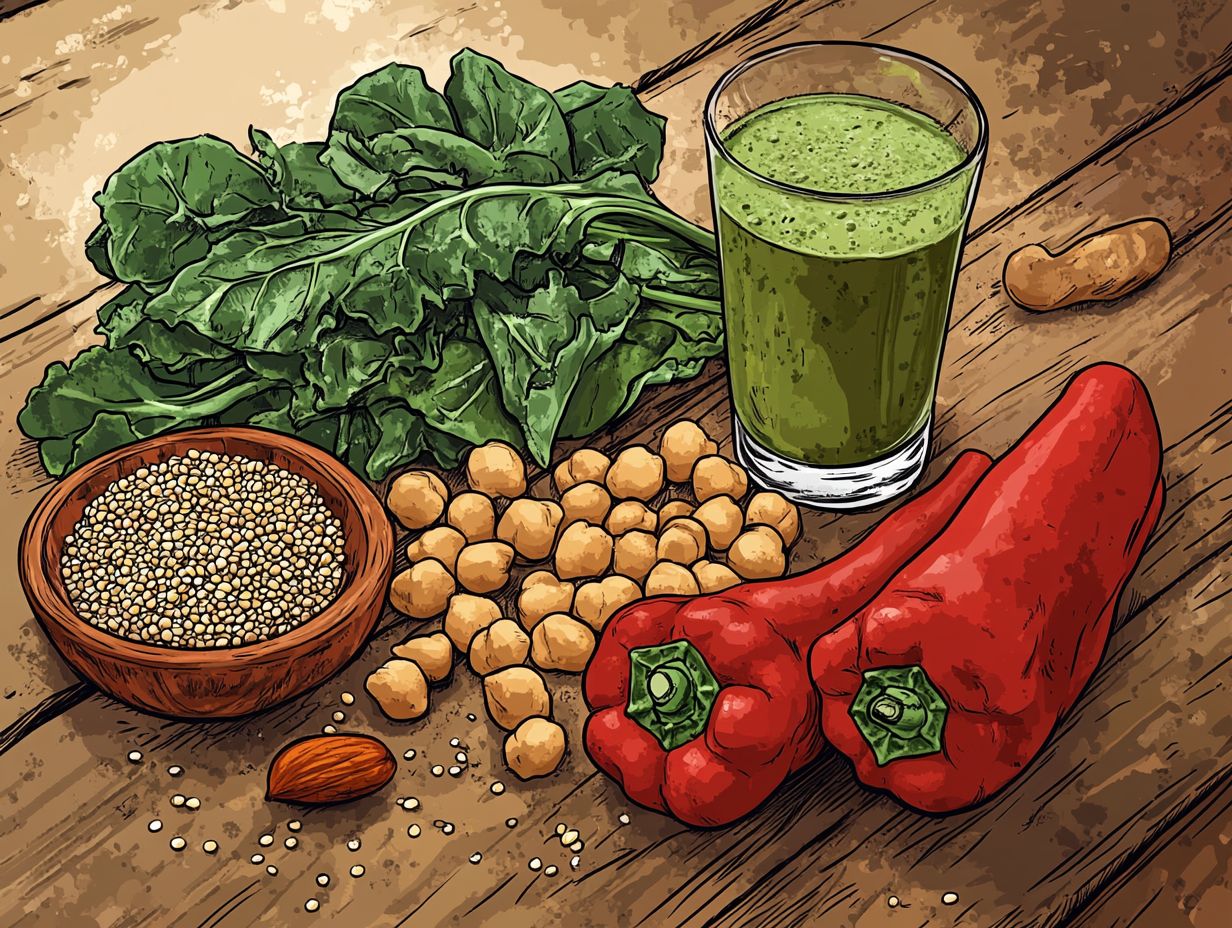
A vegan diet can be an effective strategy for weight loss, which is particularly important for individuals with Polycystic Ovary Syndrome (PCOS).
By focusing on whole, plant-based foods that are lower in calories and higher in nutrients, patients with PCOS can lose weight and maintain a healthy weight, helping to alleviate some of the symptoms associated with the condition.
This diet promotes healthy eating habits by incorporating a diverse range of fruits, vegetables, whole grains, legumes, nuts, and lean proteins.
When the body receives an abundance of vitamins, minerals, and antioxidants from these foods, energy levels increase, making it easier to engage in regular exercise.
Additionally, the fiber found in plant-based foods aids digestion and promotes a feeling of fullness, reducing the likelihood of unhealthy snacking.
Consequently, adopting a vegan lifestyle can establish a positive cycle of mindful eating and weight loss, supporting individuals with PCOS in achieving their long-term health goals.
How to Follow a Vegan PCOS Diet and Lifestyle Plan
A vegan PCOS diet plan emphasizes the consumption of natural, whole plant-based foods while ensuring a balanced intake of essential nutrients necessary for maintaining optimal health.
This dietary approach requires careful planning to include a diverse range of fruits, vegetables, legumes, and grains. Additionally, it is important to stay hydrated and limit highly processed foods that could hinder progress, while also incorporating nutritious meals that promote wellness.
1. Focus on Whole, Plant-Based Foods
A vegan diet for managing PCOS should focus on a healthy, balanced meal plan consisting of whole, plant-based foods that provide essential nutrients for both managing PCOS and enhancing overall health. Emphasizing unprocessed fruits, vegetables, whole grains, and legumes is crucial for supporting hormone balance and addressing factors that can induce or worsen PCOS symptoms.
It is vital to eat a wide variety of these foods, as this not only increases nutritional intake but also aids in weight management, improves insulin sensitivity, and helps maintain hormonal balance—factors crucial for managing PCOS.
For instance, berries are rich in antioxidants that can help reduce inflammation, while leafy greens support detoxification and provide essential vitamins. Whole grains such as quinoa and brown rice offer fiber, which is important for regulating blood sugar levels in individuals with insulin resistance. Additionally, healthy fats from sources like avocados and nuts contribute to hormonal function, and incorporating foods that support thyroid and estrogen balance is beneficial.
2. Incorporate Protein and Healthy Fats
A vegan PCOS diet can effectively support adequate protein and healthy fat intake, which are essential components of an overall healthy diet. These nutrients help address the nutritional and hormonal needs of individuals with PCOS.
Incorporating plant-based protein sources, such as legumes, nuts, and seeds, along with healthy fats from avocados and olive oil, can provide the necessary elements for a balanced diet. These protein sources are rich in essential amino acids and promote satiety, which can help prevent overeating and assist in maintaining a healthy weight—an important factor in controlling PCOS symptoms.
Nuts like almonds and walnuts not only contribute to protein intake but also provide omega-3 fatty acids, known for their anti-inflammatory properties. Additionally, the fiber found in whole foods such as quinoa and chia seeds helps regulate blood sugar levels, aids digestive health, and promotes overall energy, which is essential for maintaining a healthy lifestyle.
These components are crucial in any treatment strategy for individuals aiming to manage their symptoms through hormone balancing, and there are numerous options available for those who choose to follow a vegan diet.
3. Limit Processed Foods and Added Sugars
The effectiveness of a vegan diet for managing PCOS lies in minimizing processed foods and added sugars. These items can lead to increased insulin and blood sugar levels, which may exacerbate PCOS symptoms and contribute to weight gain and hormonal imbalances.
A diet high in processed foods and sugars can also heighten inflammation and disrupt hormonal balance, making it even more challenging to manage PCOS symptoms.
To effectively support a vegan PCOS diet, individuals should prioritize whole, unprocessed foods such as:
- Fruits
- Vegetables
- Whole grains
- Legumes
Cooking at home with fresh ingredients is one of the best strategies to reduce reliance on convenience foods that often contain additives and excess sugar. Incorporating small amounts of natural sweeteners like maple syrup or dates can help satisfy sweet cravings without compromising nutritional value.
Additionally, maintaining adequate fluid intake and being mindful of portion sizes are crucial for controlling blood sugar levels and promoting overall health.
4. Stay Hydrated
Hydration plays a crucial role in a vegan diet for managing Polycystic Ovary Syndrome (PCOS), as consuming water and hydrating foods promotes overall health and alleviates PCOS symptoms. Adequate hydration supports the body’s essential functions and enhances well-being, by influencing hormone regulation and reducing stress levels.
Proper fluid intake is particularly important for individuals experiencing PCOS symptoms, as it aids digestion, regulates hormones, such as androgens and testosterone, and can assist with weight management.
Hydrating fruits and vegetables, such as cucumbers, oranges, leafy greens, and watermelon, are particularly effective in boosting fluid levels.
It is recommended to drink 8-10 cups of water each day, and incorporating herbal teas can further contribute to hydration.
Sufficient hydration is vital for physical health, as it influences skin health and energy levels, ultimately improving overall well-being and making it easier for those suffering from PCOS symptoms to manage their condition.
Other Lifestyle and Functional Medicine Factors for Managing PCOS
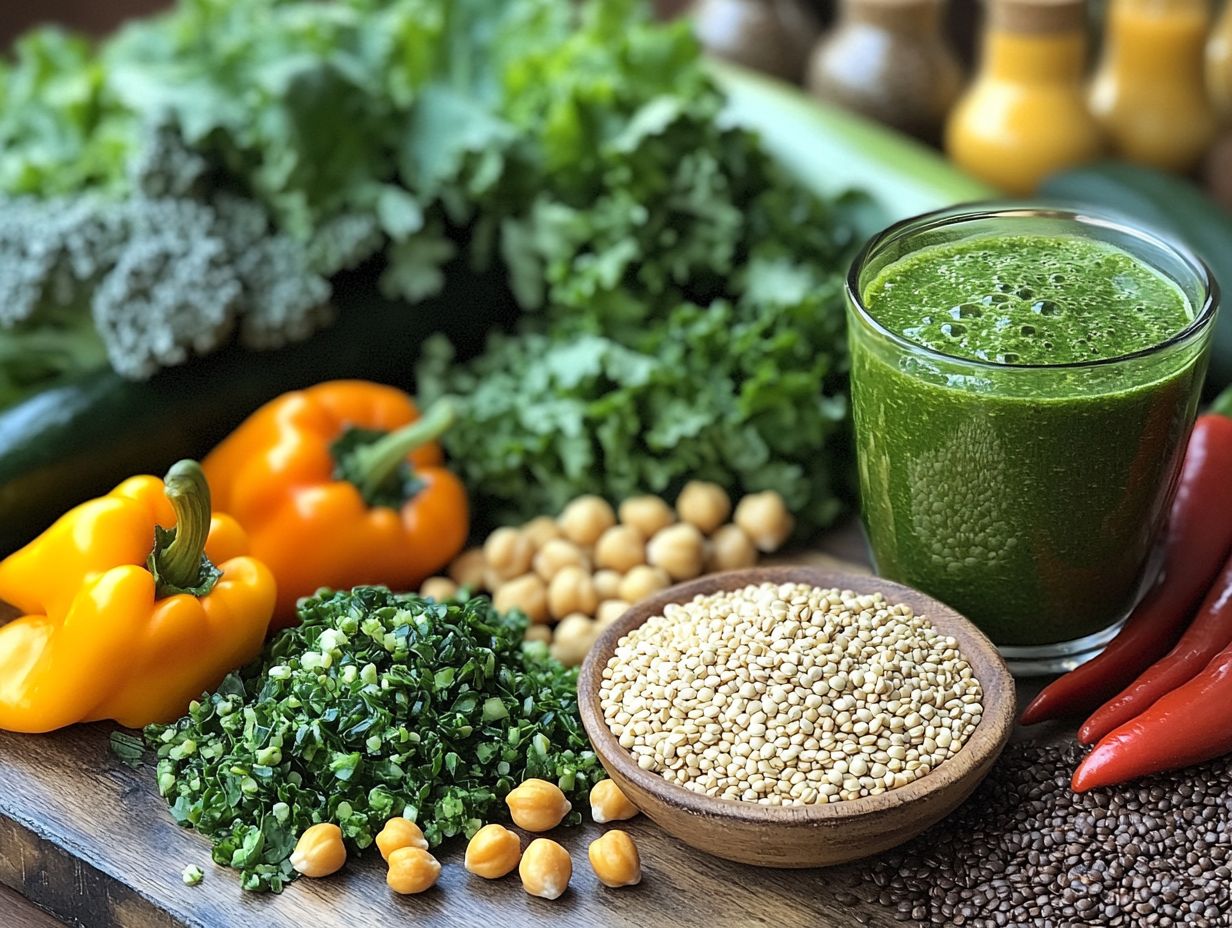
Along with dietary changes, several lifestyle factors, including stress management and health monitoring, play a crucial role in effectively managing Polycystic Ovary Syndrome (PCOS).
Engaging in regular exercise, employing effective stress management techniques, and ensuring adequate sleep are essential components of self-care that contribute to hormonal balance and overall health, positively influencing the symptoms of PCOS and promoting wellness.
1. Exercise Regularly and Monitor Health
Regular exercise is essential for individuals with Polycystic Ovary Syndrome (PCOS) as it aids in weight control, improves insulin sensitivity, and enhances overall health. Engaging in physical activity can also help manage symptoms while boosting mood and well-being. Incorporating health monitoring techniques, such as tracking exercise progress, can further enhance these benefits.
The most beneficial exercises for PCOS encompass a variety of activities, particularly aerobic exercises such as brisk walking, cycling, and swimming, along with strength training exercises that build muscle and elevate metabolism. These activities can help balance hormones, including thyroid hormones, and improve mood.
For those with busy schedules, setting aside dedicated times for exercise, trying out enjoyable fitness classes, and organizing walking meetings are effective ways to incorporate physical activity into daily life.
Additionally, fitness apps and community groups can offer motivation and accountability, making it easier to establish a consistent and enjoyable exercise routine.
2. Manage Stress Levels
Effective stress management is crucial for individuals with Polycystic Ovary Syndrome (PCOS), as stress can exacerbate hormonal and other symptoms related to the condition. Techniques for managing stress can lead to improved mental and physical health outcomes, such as incorporating intermittent fasting or a ketogenic diet under professional guidance.
Mindfulness practices, such as meditation and deep-breathing exercises, help individuals cultivate a sense of peace and awareness, making it easier to cope with daily stressors and improve hormonal balance. Yoga offers a holistic approach to stress relief by promoting relaxation and body awareness, which is particularly beneficial for those managing PCOS symptoms and stress management.
Maintaining a regular self-care routine that includes exercise, healthy eating, and adequate sleep is essential for reducing stress and enhancing overall well-being. Additionally, engaging in hobbies and spending time with supportive friends and family contribute positively to mental health and form important components of a balanced lifestyle that supports hormonal health and helps manage insulin resistance and weight gain.
3. Get Enough Sleep
Sleep plays a crucial role in managing Polycystic Ovary Syndrome (PCOS), as poor sleep can adversely affect hormonal balance, insulin levels, and overall health. Restorative sleep allows the body to heal and helps manage symptoms effectively.
Establishing a consistent sleep routine by going to bed and waking up at the same time each day is essential. Practicing a relaxing bedtime routine, such as reading or employing relaxation techniques, signals to the body that it is time to wind down. Additionally, reducing screen exposure for at least an hour before bed is important, as blue light interferes with the production of melatonin, the hormone responsible for regulating sleep. Including nutritional elements like almond milk and other dairy alternatives in your diet can also promote better sleep.
By incorporating these sleep hygiene practices, individuals can enhance sleep quality, which is a vital component of achieving better hormonal health, including managing androgens and testosterone levels, and managing PCOS symptoms.
Consulting with a Healthcare Professional
Consulting with healthcare providers is the most effective way to manage Polycystic Ovary Syndrome (PCOS), as they can offer tailored recommendations based on a person’s medical history, nutrition, and individual health needs.
Functional medicine providers, in particular, tend to be well-informed about the nutritional and lifestyle factors associated with PCOS, including the benefits of a ketogenic diet and intermittent fasting, making them better equipped to assist patients in their management. Partnering with these experts increases the likelihood of receiving personalized treatment options that can enhance overall health, while also allowing for the integration of dietary recommendations from nutrition specialists.
Implementing dietary modifications is essential in managing PCOS, as it can help restore hormonal function and improve metabolic health. Incorporating low glycemic index foods, vegetables, and lean proteins can be particularly beneficial. Personalization is especially important, as it considers factors such as age, lifestyle, and personal preferences, all of which are vital for achieving sustainable and long-term health improvements.
Furthermore, collaborating closely with healthcare professionals ensures that individuals have access to the latest research and therapeutic options available, including health monitoring for thyroid and estrogen levels.
Tips for Sticking to a Vegan PCOS Diet Plan
Following a vegan diet for managing PCOS can be challenging, but individuals can succeed by implementing effective strategies, such as including nutritious meals with a focus on vegetables and lean proteins.
Meal planning, self-care practices, and seeking support are essential for maintaining a healthy PCOS diet that addresses the unique dietary needs of those with Polycystic Ovary Syndrome (PCOS), including managing insulin resistance and blood sugar levels for optimal wellness.
